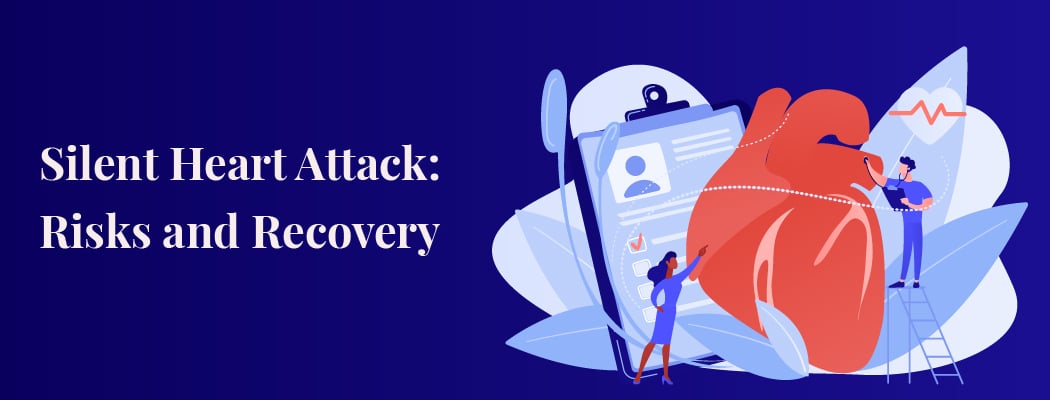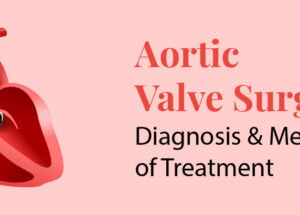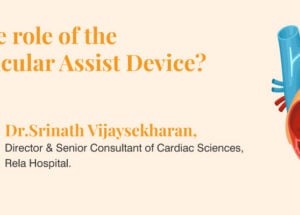Silent Heart Attack: Causes, Symptoms and Treatment
November 17, 2022

Often, people don’t realize they’ve undergone a silent heart attack until a doctor finds cardiac abnormalities weeks or months later. It can be challenging to recognise a silent heart attack if there are missing indications or symptoms that are often unrelated to a heart attack. However, it still has adverse effects similar to a heart attack would.
When a heart attack has no symptoms, minor symptoms, or signs that others don’t associate with a heart attack, it is referred to as being “silent.” A heart attack, often referred to as a myocardial infarction, occurs when your heart isn’t receiving enough oxygen. This causes heart damage. Typically, a blood clot prevents blood from passing through one of your coronary arteries, which results in a heart attack. Less frequently, a coronary artery spasm can stop your blood flow.
Heart attacks can occur whether you are awake or asleep. They may occur when:
- You’ve just experienced intense physical or emotional stress
- You rapidly start moving around more
- You exercise outside in the cold weather
Who is affected by a silent heart attack?
Women may experience silent heart attacks more frequently.
A silent heart attack: How frequent are they?
Some estimates say nearly 50% to 80% of all heart attacks are silent.
How does your body respond to a silent heart attack?
Similar to a more evident heart attack that prevents oxygen from flowing to a part of your heart, a silent heart attack can harm your heart. However, if you don’t recognise the symptoms of a heart attack, you might not receive the necessary medical attention to reduce the damage. In addition, an increased risk of heart failure has been associated with a silent heart attack.
Symptoms of silent heart attack
People who experience a silent heart attack show minor or nonexistent symptoms and symptoms not often related to heart attacks. As a result, they can be unaware that they have a heart attack.
The following symptoms may occur during a silent heart attack:
- You have the flu
- You have a sore muscle in your upper back or chest
- You feel pain in your arms, upper back, or jaw
- You’re exhausted
- You’ve got indigestion
Traditional heart attack symptoms could include the following:
- Chest ache that persists for a long time.
- Breathing difficulty.
- Discomfort in your upper body.
- Lightheadedness.
- Cold sweats
- Vomiting and nauseous.
- Fatigue can continue for a few days and has no cause.
How can I recognise whether I’m experiencing angina or a heart attack?
Chest pain might occur when moving around in people with ischemic heart disease. After a few minutes of rest, the discomfort subsides. However, if your chest pain persists, you might have a heart attack.
What increases your risk of having a silent heart attack?
You may be more susceptible to a heart attack if you have other health problems. These consist of the following:
- Being overweight
- Not regularly exercising
- High blood pressure
- A high cholesterol level
- Eating a lot of foods that are high in salt, cholesterol, and unhealthy fats
- A high blood sugar level
- Experiencing stress
What triggers a silent heart attack?
In your coronary arteries, cholesterol-containing plaque builds up. The plaque becomes blocked by a blood clot, which prevents oxygen-rich blood from reaching your heart muscle.
What should I anticipate if I experience a silent heart attack?
Depending on how much a heart attack hurts, everyone’s experience will vary slightly, but most individuals can gradually return to their everyday lives and activities.
Cardiac failure or irregular heart rhythms in some persons can be quite dangerous. For example, people who delay seeking assistance after suffering a heart attack run the danger of severe heart damage and may not survive if they don’t do so quickly enough.
What symptoms indicate a quiet heart attack?
Your doctor might discover that you have:
- Rapid or irregular heartbeat.
- Unusual noises coming from your lungs.
What types of testing are used to identify silent heart attacks?
A silent heart attack is frequently discovered weeks or months after it occurs by:
- Physical assessment
- A blood test
- Electrocardiogram
- Coronary angiography
- CT scan
- Magnetic resonance imaging (MRI)
- Exercising stress test
- Nuclear stress test
- Echocardiogram
How long does a quiet heart attack typically last?
A quiet heart attack might last anywhere from minutes to hours. However, when symptoms appear, a person should see a doctor immediately.
The heart may suffer harm if the blood supply is cut off for more than 15 minutes. It takes around 30 minutes for the harm to become permanent. For example, to restore blood flow and stop vital cardiac tissue from dying.
What long-term care should I give myself after a silent heart attack?
You might need to alter your lifestyle following a heart attack, such as:
- Maintaining a heart-healthy diet
- Being active
- Giving up tobacco use
- Maintaining an appropriate weight
You should continue to take the medications prescribed to you by your doctor and follow their recommendations. And it’s crucial to visit your doctor for routine checkups. Your doctor could decide to do another ECG in some circumstances.
Consult a cardiologist if you notice the above symptoms.
People also ask
1. How do you know if you’ve had a silent heart attack?
Breathlessness is a common indicator of a silent heart attack and can happen with or without chest discomfort. Additionally, you can experience lightheadedness or dizziness, and you might even pass out. Although both men and women can share this, women are more likely to feel shortness of breath.
2. Can you feel a silent heart attack?
Yes, when a doctor discovers heart damage weeks or months after the fact, many people are only then aware that they suffered a silent heart attack. It can be challenging to recognise a silent heart attack if there are missing indications or symptoms that are often unrelated to a heart attack. However, the damage is still done, just like any other heart attack.
3. What happens during a silent heart attack?
Silent heart attack patients may mistakenly believe they have heartburn, the flu, or a strained chest muscle. But just like a regular heart attack, a silent heart attack causes a restriction in the blood supply to the heart and may even harm the heart muscle.
4. Can you survive a silent heart attack?
Heart attacks can occur and go unnoticed. SMIs, or silent myocardial infarctions, account for 45% of all heart attacks and affect males more frequently than women.








